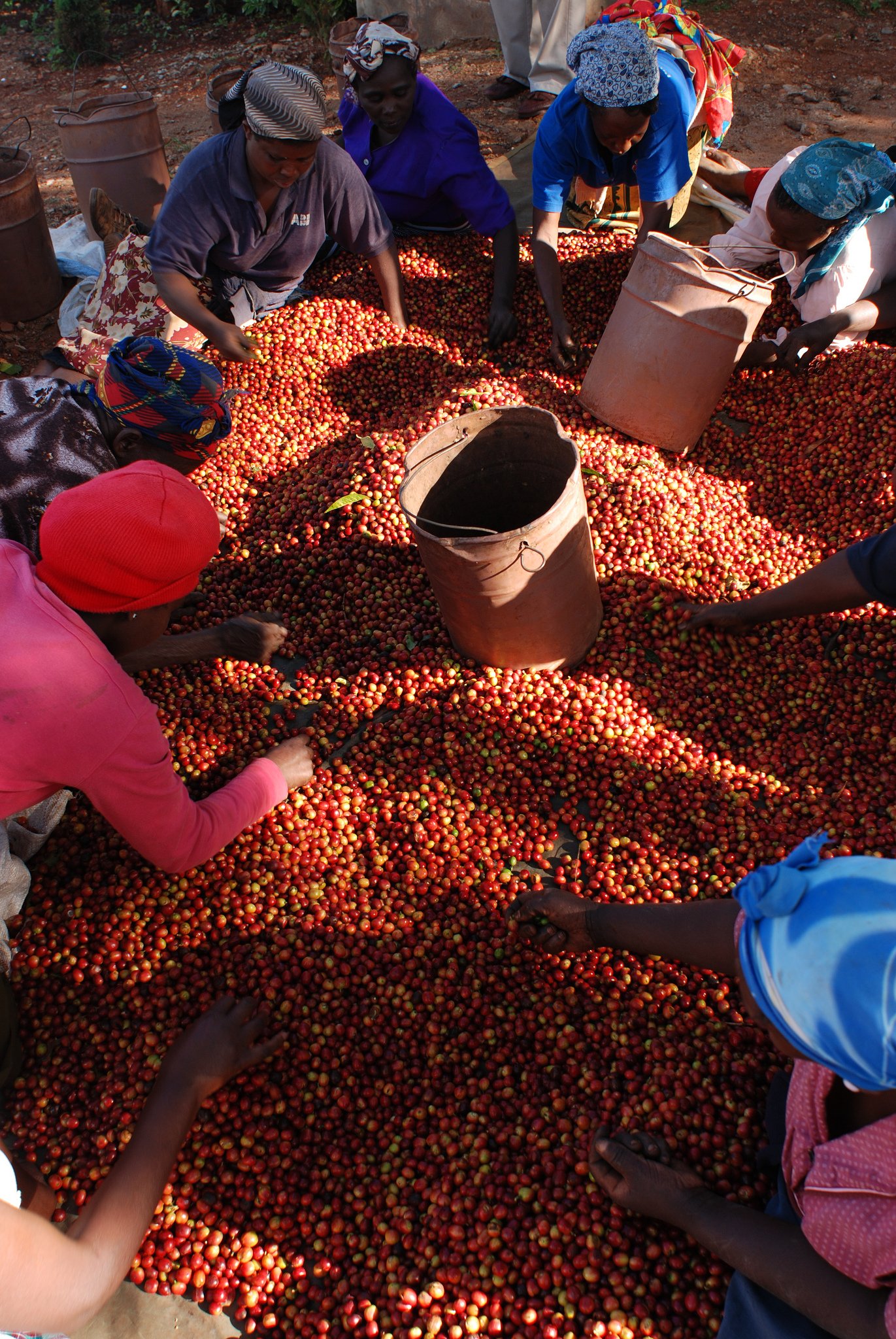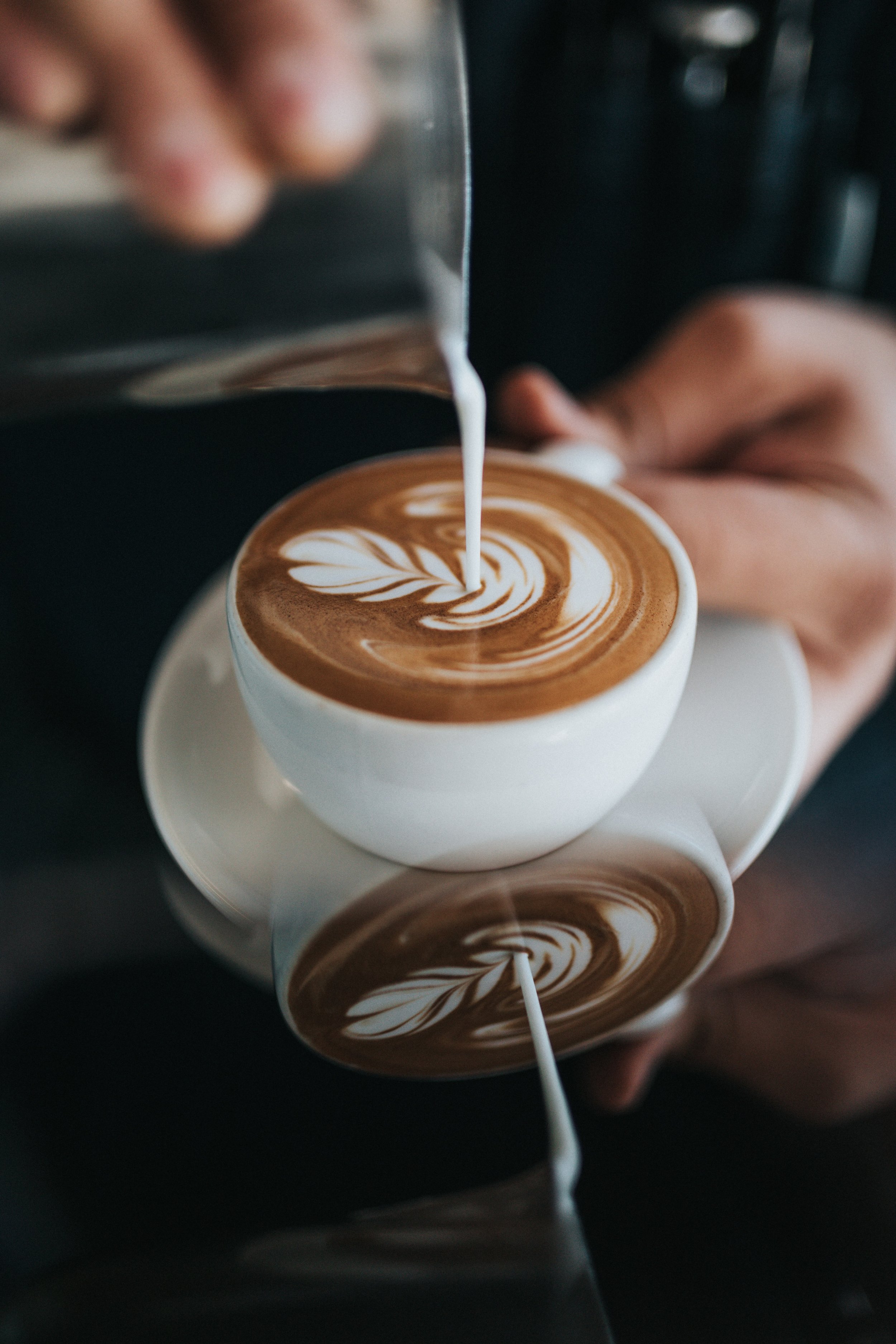Kenyan Coffee’s Next Wave Focuses on Home
By Harriet Akinyi
In the era of British colonization, in the first half of the 20th century, Kenyans were only allowed to plant coffee in white people’s farms and after harvest, it was an export overseas. Here, a Kenyan woman picks coffee on a British plantation in 1936. Photo from Matson Collection, Public domain, via Wikimedia Commons.
One of first things that people grab in the morning all across the world is coffee. But when it comes to Kenya, my mother land, the beverage is slowly but steadily overtaking tea, which was traditionally the preferred drink ever since it was introduced by colonizers. This is despite the fact that Kenyan coffee is one of the best in the world, with its beans deemed elite, owing to the full-bodied, delicate, complex brew they produce.
For 18-year-old Milton Muthoka, the love of coffee and specifically, latte, began in 2019, inspired by his parents who are also coffee fans.
“I love coffee because it smells nice, stimulates my brain and it has a nice taste. It also gives you warmth during the cold season like now in Nairobi,” he says.
Muthoka believes that most Kenyans have begun loving coffee thanks to the many restaurants opening up like Java and Art Caffe.
“There is also the mainstream international media houses which have made us watch how people in the U.S. behave, particularly with their coffee culture in the morning and this has made us emulate this habit,” Muthoka says. “Nowadays, it’s easy to hear people taking each other out for coffee either as lovers, as friends, or a business meeting.”
Caroline Gichuki, another coffee lover—she began taking coffee at the age of 12 to assist her stay awake while studying for her exams—also believes that the drink is slowly gaining ground thanks to the many coffee restaurants coming up.
“I think the fact that it helps keep one alert and its sweet really pushes people to take more coffee,” she says. “In addition, unlike before when it was simply designated for the rich, right now it is more affordable making us all prefer it.”
***
In the era of British colonization, in the first half of the 20th century, Kenyans were only allowed to plant coffee in white people’s farms and after harvest, it was an export overseas. They were also taxed, their fertile land taken away and had to carry a kipande, or identity card, showing where they worked. This was meant to keep them tied working for the white man and not focus on planting their own crops. Only the coastal towns had the experience of drinking coffee, since Arabs lived there and loved the drink.
However, things shifted at independence in 1963. A new black government was formed, which did away with the oppressive laws that forbade Africans from growing tea or coffee. Michael Warui’s father became one of the African farmers to own coffee plantation in Kiambu around the ’70s. Their farm, Fairview Estate, was established in 1909.
“In the colonial period of our history, it was illegal for Kenyans to grow coffee, and very few, if any, consumed the beverage that was the preserve of the British,” Warui says. “But with the start-up of local companies that are an outlet for good Kenyan coffee (e.g., the Java chain of restaurants), this is changing as a younger generation identifies with a beverage that speaks to one’s sophistication and aspirations.”
The current generation of coffee farmers tend to be more knowledgeable about their coffees and of global consumer preferences. Photo by Kamweti wa Mutu, CC BY-SA 4.0, via Wikimedia Commons.
Research indicates that Africa produces 40 percent of the world’s coffee beans and yet only engages in 3 percent of global trade. This is because the value of Africa’s produce is being enhanced away from the continent. However, with a new generation assuming greater responsibility over family businesses, and perhaps with a depth of business understanding, this is changing.
***
“Fifteen years ago, Fairview Estate selected to begin the journey of demanding more value for its produce,” Warui says. “The first step was to undertake global certification through the Rainforest Alliance, Global Coffee Platform, UTZ and Starbucks. This certification that ensured that single origin producers were growing their coffee with minimal chemical inputs; were caring for their human resources properly; and were adopting best farming practices. Consumers rewarded this certification by paying trip or quadruple priced for the top grades of coffees in comparison to the coffee sold at the Nairobi Coffee Exchange.”
He adds that the estate further diversified in 2015 as a center where international and domestic tourists were welcome to experience immersive tours where they would be educated on the coffee and see how coffee is grown and processed. This is how their business was able to survive the tough times where the price of coffee production has fell from over 100,000 tons to below 50,000 tons.
“While the great bulk of our coffee is sold to buyers overseas (95 percent or more), it
is hoped that the shift to local consumption and tourism will be of benefit in coming years,” he says. “While Covid-19 disrupted the business for a season of two years, we are in the process of business recovery and we encourage domestic customers to support us and see what we have on offer.”
The current generation of coffee farmers tend to be more knowledgeable about their coffees and of global consumer preferences. Warui believes that what is needed is to match this superior knowledge with an enabling policy environment that allows them to capture greater value for their sweat equity.
“As awareness of Kenyans increases concerning the generally inferior tastes of coffees imported from overseas and that they have alternatives to purchase directly from local producers, preferences will change because the local options provide a far superior coffee cup in terms of acidity, body and flavors,” he says. “Additionally, when Kenyans support local businesses, they are supporting the national government and their fellow compatriots more broadly.”
His company sells directly to the consumers, and some of its other buyers include Sagana Commodities, Louis Dreyfus, Starbucks, C. Dormans, Sondhi Trading Company, Diamond Coffee, Servicof Limited, etc. The company charges a premium.
“We make $50 USD per kilogram, while most cooperative farmers will get 50 cents per kilogram after expenses,” he says.
There are three coffee marketing systems: the traditional market, the fair trade as well as direct coffee trading. After the collapse of the quota system signed in 1988 by countries producing coffee, the market was liberalized, resulting in cartels or multinationals taking over the market.
The cooperatives take farmers’ beans to an auction and negotiate on the prices on behalf of the farmers. Here’s the catch: Before they trade, farmers are required to be in these cooperatives. The cooperatives have to meet a certain standard when it comes to labor laws and quality standards of the coffee produced.
Factors such as climate instability and price fluctuations affect coffee proceeds, putting the farmers livelihoods at risk.
The capitalist system puts coffee-producing countries at the mercies of prices set by developed countries who buy the coffee. Various NGOs have come up like the Coffee for Change and Oxfam to fight the dictates of the New York and London exchanges and give farmers a better pay for their produce. Farmers frustrated by this system have opted to trade directly to the market, which is more profitable than selling via cooperatives. The ability to do this has been a factor in making better coffee more available within the country, too.
Many Kenyan baristas are moving to Dubai in search of greener pastures, since the pay there is better than at home. Photo by Nathan Dumlao on Unsplash.
When she moved to Dubai in 2015, Purity Wangare, a coffee barista, believed that the emergence of baristas has also resulted in the rise of coffee culture in Kenya.
“I have seen so many coffee schools back home, which is great,” she says. “There are barista courses one can take to learn the skill. The rise of baristas is good as they understand how to upsell coffee beans to the customers, which means better quality of coffee and customer experience which in turns brings back repeat clients.”
Being overseas, she and her husband are torn between coming back to the country and starting a small coffee shop or a green bean trading.
“We would love to work closely with farmers where we can practice ethical trade and pass some great training that we have learned over the years,” she says. “The challenges of coffee farmers like any other developing country, farmers are exploited.”
Many Kenyan baristas are moving to Dubai in search of greener pastures, since the pay there is better than at home. Some are sharing their experience and knowledge through their social media pages, like Samson Kibunja, or Slick Barista, who has been a barista for seven years in Kenya and three years in UAE. He began an online group of African coffee drinkers to educate as well as share their experiences of the drink.
“Coffee gave me a life, a career, a love and passion. Education and also creating a coffee drinking culture, in Kenya is what makes even the low class begin appreciating the drink,” says the barista who was influenced by his late grandfather, a coffee farmer, to take up his career.
Kevin Nduati, another Kenyan barista based in Dubai, wants to use his experience to run his own coffee processing station, where he will train and educate Kenyan farmer on how to take care of their coffee.
“When I was young, my grandmother used to tell me that all the good coffee is always exported to over countries, but the bad one is left in Kenya,” he says. “I desire to let Kenyan farmers to always be the first ones to have a taste of the fruits of their labor.”
This passion came after years of watching his grandmother pass through difficulties as a coffee farmer.
“In the past, coffee as a cash crop was not always a reliable source of income, as it could take months for the farmer to be paid for the harvest the made,” he says. “Sometimes a farmer could do even two seasons of harvest without getting the returns, and when the money comes it was just not enough to feed the family. Now that coffee industry has really grown, improvement is being noticed as we have people coming from all over the globe supporting farming in different ways including, training the farmer on how to improve the quality of their coffee, chemicals to use in order to retain the best quality. Coffee, how to improve the quality of coffee in order to get better income and they even go an extra mile and buy tons of coffee from these farmers. I wouldn’t say it has happened to all farmers, but it is a noticeable progress [that] has helped a lot of farmers.”



